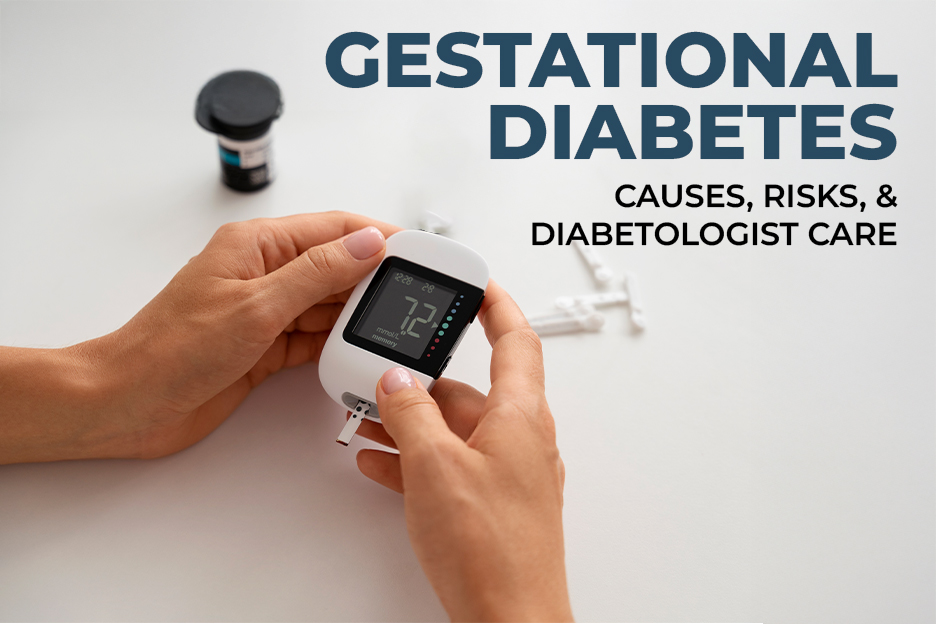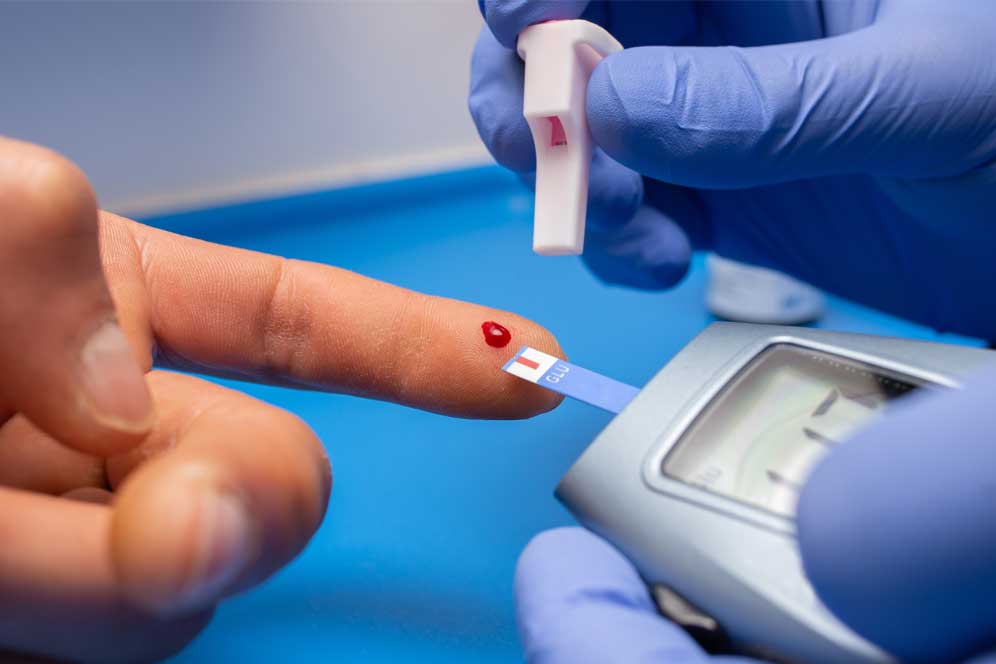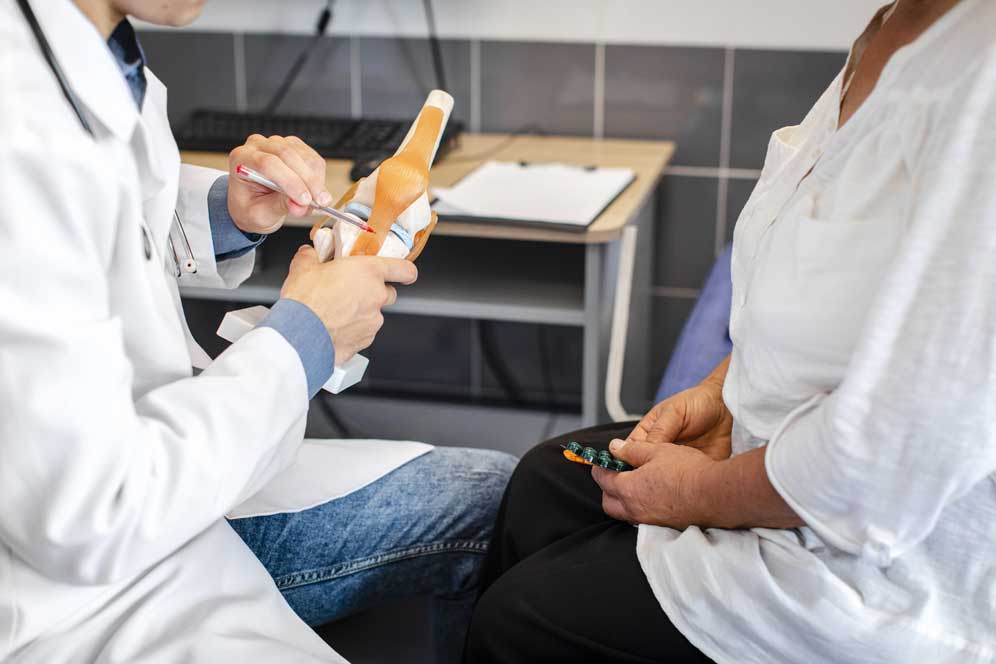
7 Jul 2025
Gestational Diabetes: Causes, Risks, and Diabetologist Care
Gestational diabetes is a condition that affects pregnant women, typically emerging in the second or third trimester when the body struggles to manage blood sugar levels effectively. Unlike other forms of diabetes, it develops only during pregnancy and usually resolves after childbirth. However, it poses significant health risks to both the mother and baby if not properly managed. Understanding its causes, recognizing the potential complications, and seeking timely care from a diabetologist are essential steps in ensuring a healthy pregnancy and delivery.
Though transient, gestational diabetes can have grave consequences for the mother and child if neglected. The good news is that with timely diagnosis, good monitoring, and care by specialists—especially a diabetologist—the risks can be minimized. This blog is dedicated to understanding the causes, risks, and benefits of diabetologists in the management of gestational diabetes and postpartum care.
Somewhat of a Definition
Gestational diabetes is defined by the body's inability to produce adequate insulin during pregnancy—insulin being the hormone that controls blood sugar levels. Blood glucose levels rise above normal during pregnancy, and, if not controlled, these can have a negative effect on the health of both the mother and baby.
During pregnancy, the placenta releases hormones that inhibit the action of insulin—this is referred to as insulin resistance in pregnancy. Gradually, insulin resistance increases, whereas the pancreas fails to meet the increased demand for insulin. The resultant imbalance in hormones causes high blood sugar levels, hence gestational diabetes.
Unlike type 1 or type 2 diabetes, which have many symptoms, the majority of the patients with GDM have no symptoms. Nevertheless, for these very reasons, routine screening for GDM is therefore vital.
Symptoms of Gestational Diabetes
Most women with GDM will not notice overt symptoms; others may notice very subtle changes, including:
Excessive thirst
Frequent urination
Fatigue
Blurred vision
Increased hunger
However, since these symptoms can easily be confused with the normal changes of pregnancy, regular glucose screenings are vital during the second trimester, between 24 and 28 weeks.
Causes and Risk Factors
While the exact cause of gestational diabetes isn’t known, several factors increase the chance of developing the condition:
Overweight or obesity prior to pregnancy
Family history of type 2 diabetes
Having had gestational diabetes before
Polycystic ovary syndrome (PCOS)
Delivery of a large baby (> 4kg- 9lbs)
Inactivity
Being over 25 (anyone) years during pregnancy
It is important to know that even women without any risk factor can develop GDM, and that is the reason why every pregnant woman must be routinely screened.
Risks Associated with Gestational Diabetes
While gestational diabetes is manageable, it can present health risks for both mother and newborn if not timely addressed.
Risks to the Baby
Macrosomia (large baby size), increasing the chances of delivery complications
Preterm birth
Hypoglycemia after birth
Higher risks for obesity and type 2 diabetes in later stages
Respiratory distress syndrome
Risks to Mother
High blood pressure and preeclampsia
More chances of having a cesarean section
Higher chances of developing type 2 diabetes later in life
Understanding these risks strengthens the will to prevent the associated complications with the proper management of gestational diabetes and lifestyle alterations.
The Role of a Diabetologist for Pregnancy Care
Management of gestational diabetes is not a single-handed task; it requires quite a number of players in healthcare, and at the hub of the management is the diabetologist.
A diabetologist is a specialist in the management of diabetes. These medical professionals provide an invaluable role by guiding these expectant mothers through all phases of pregnancy. Their input can make the following difference:
1. Diagnosis and Monitoring
Diabetologists join forces with obstetricians to carry out glucose tolerance tests, risk assessment levels, and once diagnosed, develop a personalized monitoring plan to keep blood sugar within a healthy range.
2. Counseling about Diet and Lifestyle
Management of gestational diabetes mostly begins with lifestyle changes. Diabetologists develop individualized nutrition programs that emphasize balanced carbohydrate intake, fiber-rich foods, and appropriate portion sizes. They could also recommend safe pregnancy exercises to enhance insulin sensitivity.
3. Management of Medication
Where lifestyle changes fail to produce the required results, diabetologists could resultantly administer insulin therapy or antihyperglycemic oral agents. They will closely observe the glucose trends and modify them in tandem with the demands of the pregnancy.
4. Fetal Monitoring and Delivery Planning
In collaboration with gynaecologists, the diabetologists assist in fetal growth assessment and planning of safe delivery in order to reduce the risk of obstetrical complications such as shoulder dystocia or cesarean section.
Gestational diabetes has a history of being unpredictable; however, risk factors can reduce the chances and assist in ideal management in case of occurrence:
Keep an appropriate weight, before and during pregnancy
Conduct some form of physical exercise like walking, yoga, or swimming
Follow a balanced diet comprising fiber, lean protein, and whole grains
Limit consumption of sugary foods and drinks
Avoid excessive weight gain during pregnancy
Attend all prenatal visits and glucose monitoring
Pregnant women adopt a proactive approach to minimizing complications while having a healthier pregnancy journey.
Postpartum Diabetes Screening
The care would usually not end after birth. Indeed, the weeks and months following parturition are, for mothers who had gestational diabetes, the most critical time.
GDM women have an increased risk of developing type 2 diabetes at some point in their lives. Therefore, postpartum diabetes screening around 6 to 12 weeks after delivery is very important to pick up any persistent glucose intolerance.
Despite normal glucose levels being restored, screening needs to continue every 1 to 3 years. Modifications in lifestyle after pregnancy, such as regular exercise and healthy eating, plus breastfeeding, can also lower the risks of diabetes later in life by significant proportions.
Conclusion:
Gestational diabetes seems overwhelming; however, through early detection, disciplined management, and the right medical support, most women can enjoy healthy pregnancies and healthy babies. Knowing the causes, recognizing the risks, and accepting the care of a qualified diabetologist is the key.
Whether this is your first pregnancy or you've had GDM in a previous pregnancy, being informed and proactive can make all the difference. Do not skip screenings, do what doctors tell you to do, and, most of all, listen to your body to be as informed as possible.
After all, pregnancy wellness leads to a healthier tomorrow for mother and child.
Recent Blogs
-

We will work with you to develop individualised care plans
Arora Neuro Centre maintains awareness about the vital association between diabetes and neurological health issues where diabetic patients face greater stroke susceptibility.
-

How Diabetes Affects Brain Health: The Hidden Risks
Typically diabetes causes problems with blood sugar management as well as negative effects on heart organs and kidneys.
-

Can Diabetic Neuropathy Be Prevented? What You Need to Know
One of the typical complications arising from diabetes affects nerves through diabetic neuropathy which results in various symptoms from muffled sensation and tingles to intense pain.
-

Psychotherapy for Anxiety: Techniques That Really Work
Anxiety is one of the most common mental health conditions in India and around the world. It can affect anyone, whether you’re a student under pressure, a working professional managing deadlines, or a parent juggling multiple responsibilities
-

Physiotherapy vs. Chiropractic: What's Really Differentiating Them?
Physiotherapy and chiropractic care both aim to relieve pain and improve mobility, but they differ in approach. Physiotherapists focus on exercise, movement, and rehabilitation, while chiropractors primarily use spinal adjustments to treat musculoskeletal issues. Understanding these differences can help you choose the right treatment.
